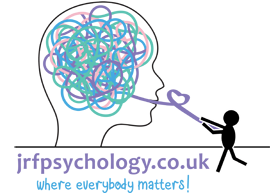Depression
Depression, unlike the occasional day where you may feel sad, affects each and every one of us differently. But there are experiences that are more common when experiencing depression. Whilst you may be able to go about your daily tasks for some days at other times it can be very different. You may feel like a black cloud is hanging over you and no matter what you do it’s very difficult to shift. This may lead to you isolating yourself which you belief may be better for you and those around you. You may also feel a sense of guilt of not being happier for your loved ones; you may also hear the remark “just snap out of it” - if only it was that easy - if you could you would and you wouldn’t be reading this page today!
Also your gender and culture may also impact on you. For e.g. it has long been acknowledged that males find it hard to enter into treatment. This may be because of their culture ‘oh just man up’; your family belief system ‘back in my day we just got on with it’; or their relationship with our loved ones ‘I can’t let them/her/him down they need me to be strong for them I’ll just carry on I’ll be OK’. Other reasons for not seeking help may be that you fear it will make you feel rejected, ridiculed or deprived of a sense of control.
Whilst I cannot make you believe me at this point I hope in time you’ll begin to realise that entering therapy to address whatever you are experiencing is a very brave move indeed. You are worthy of help, no matter how trivial (or undeserving you may believe you are 'there's someone worse off than me') you may perceive your problems to be.
So how do you know if you’re experiencing depression? Sometimes it is not you who notices but a family member/work colleague who has noticed a change in your behaviour and is concerned about you.
Some of the symptoms of depression:
- a sense of worthlessness
- that life isn’t worth living (if this is a serious thought it is essential that you contact your doctor or local crises team as soon as possible
- anxious, tearful and worried
- difficulty concentrating
- difficulty making decisions
- irritable and intolerant of others
- reduced enjoyment out of life
- low self-esteem
- excessive and inappropriate guilt
- little motivation or interest in things you used to enjoy
- isolate yourself from family/friends
You may also experience:
- difficulties sleeping
- changes in eating patterns
- tiredness/loss of energy
- persistent headaches and/or stomach upsets
- chronic pain
- a slower speaking pattern than usual
- loss of libido
- changes to your menstrual cycle
You may not notice if you have developed depression, especially if it has been a gradual process over a number of weeks or months. Sometimes it takes a friend, a family member or a partner to point out that you may have a problem.
Is there just one type of depression? No, there are several common types as the following will explain:
Mild depression:
this is when your depression is not overwhelming; you are able to go about your daily business without much impact. You may experience low mood and find it difficult to motivate yourself at times.
Major (clinical) depression:
A more severe form that can lead to hospital admission. Symptoms will be more prominent and interfere with daily life. They can affect eating habits, sleeping, and other day-to-day activities. Some sufferers may feel suicidal and that life is no longer worth living.
Bipolar disorder:
with this you may experience times of extreme highs during which you feel you can ‘take on the world’ and be very creative, and over ambitious, with ‘many ideas you wish to implement in the future’. At the other end you may experience extreme lows where you find it very hard to get out of bed.
Postnatal depression:
A condition that can develop in women between two weeks and two years after childbirth.
Seasonal affective disorder (SAD):
A form that’s closely related to the length of days. It typically occurs in the autumn and winter months when the days are shorter. Symptoms tend to alleviate when the days get brighter and longer.
Whatever your presentation it is essential that a full clinical assessment is carried out so that you are able to access the correct treatment.
Additionally, it is essential to rule out any physical health condition that may be causing/impacting on your condition. For e.g. your GP will look to diagnose the condition by conducting tests to rule out other health problems such as an under-active thyroid.
Is depression treatable?
Depression is a manageable condition. Treatment may either be through psychological therapy and/or medication from your doctor.








